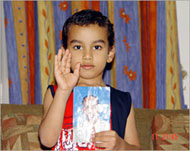The Guantanamo detainee
Sami al-Hajj was arrested in Pakistan in December 2001, on an assignment to work in Afghanistan as a cameraman for Al Jazeera, he was handed over to US forces in January 2002.

He has been detained in Guantanamo Bay as an “enemy combatant” for five years, during which Clive A Stafford-Smith, his lawyer, claims he has been been beaten, tortured and sexually and racially abused.
Stafford-Smith said: “The Americans have tried to make him an informant with the goal of getting him to say that Al Jazeera is linked to al-Qaeda.
“He is completely innocent. He is about as much of a terrorist as my granddad. The only reason he has been treated like he has is because he is an Al Jazeera journalist.”
Al-Hajj’s detainment has been criticised by several human rights groups and Reporters Without Borders, the Paris-based international media watchdog .
Road to Guantanomo
Al-Hajj, 35 and a Sudanese national, was a member of the Al Jazeera news team that covered the US invasion of Afghanistan in 2001.
He was arrested by Pakistani police in December of that year in Chaman when he and a colleague tried to re-enter Afghanistan. Al Jazeera had asked them to cover the inauguration of the new government.
Al-Hajj was detained because of a Pakistani intelligence notice that called for his arrest because of suspected links to al-Qaeda.
He was held in Pakistan for 23 days and on January 7, 2002, was moved to a military jail in Quetta, that same night he was handed over to US forces.
|
|
Having confiscated his passport, airline ticket to Doha and Al Jazeera press card, American troops transferred him to a detention centre at Bagram airbase in Afghanistan.
Al-Hajj describes the 16 days he spent at the base as the worst of his life.
 |
|
Al-Hajj says interrogators |
He claims that he was tortured before being transferred to Kandahar in southern Afghanistan for five months, where he says he received similar treatment.
On June 13, 2002, al-Hajj was transferred to Guantanamo Bay. On the flight there he claims that prisoners were not allowed to sleep and had to wear gloves, eye goggles, gags and have their hands and feet linkedby shackles.
At Guantanamo, al-Hajj said he has been beaten and abused by interrogators, who demanded that he incriminate Al Jazeera.
He said he was asked to spy for the US in exchange for citizenship and that the interrogators threatened to harm his family, including his five-year-old son, if he did not comply.
Enemy combatant
For most of his time under US detention, al-Hajj did not know why he was being held.
On March 28, 2005, nearly four years after his arrest, the US announced a number of charges against al-Hajj and labelled him an “enemy combatant”.
All the charges have been denied by Ahmad Ibrahim, al-Hajj’s colleague and biographer.
The US claimed that al-Hajj had travelled to the Middle East, the Balkans, and the Caucasus for clandestine purposes.
 |
|
Al-Hajj was held for nearly |
Ibrahim said al-Hajj’s visit to Kosovo was purely work-related, that a trip he made to Syria was a family holiday and that he visited Azerbaijan because his wife is an Azeri national.
The US claims that al-Hajj ran an internet site that supported terrorists. Ibrahim denies this.
Al-Hajj is also charged by the US with arms dealing. Ibrahim describes this as “total nonsense” and believes that the allegation is possibly the result of a conversation that al-Hajj witnessed while in prison in Chaman.
Ibrahim said al-Hajj’s cell-mate, a drug dealer, told Pakistan’s military intelligence that he had access to a Stinger missile in Afghanistan and this led to al-Hajj being implicated.
The US claims that al-Hajj was caught entering Afghanistan illegally, but Ibrahim said his passport shows that he had a valid entry visa. The US also accused al-Hajj of interviewing Osama bin Laden, but has now dropped the charge.
Terrible mistake
Al-Hajj, is said to be in poor health and has not seen his wife and son since his capture.
Staford-Smith said: “It is very worrying, a US doctor has told al-Hajj that he should not have an operation on his right knee because the lack of appropriate medical aftercare means that he could be permanently disabled.
“He is still not getting the medication needed in the wake of his earlier throat cancer. All in all, when the US military says he is getting quality medical care that is simply false.”
When asked about a possible release of al-Hajj in the near future, Stafford-Smith said: “I hope so.” But he conceded that his previous optimism had proved misplaced.
He believes that al-Hajj’s chances of release “hang on Qatar’s willingness to help him, as much as anything”.
Stafford-Smith said: “We are continuing to work for his release and to press the US to recognise that they have made a terrible mistake in his case.”